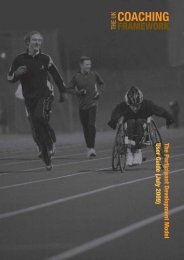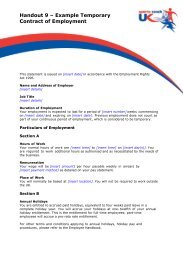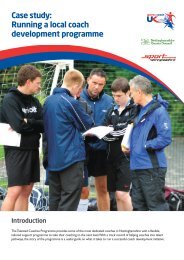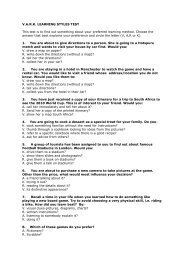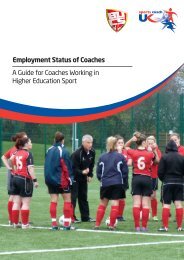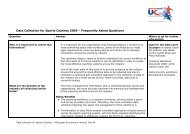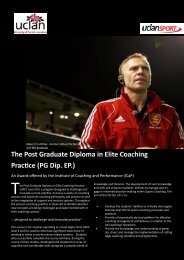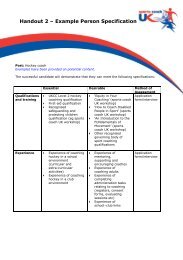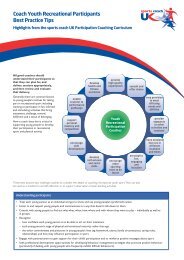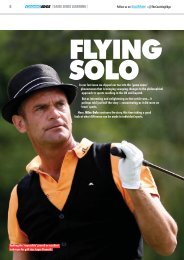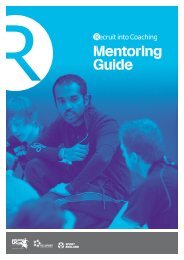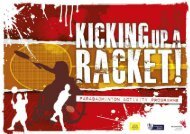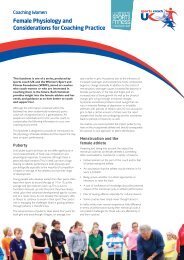36<strong>Creating</strong> a <strong>Mentoring</strong> <strong>Programme</strong> <strong>for</strong> <strong>Sport</strong>6• opportunities to express expectations, concernsand expected challenges (and ways toovercome these)• key policies and procedures with regard to theoperation of the programme (perhaps includinga code of practice)• project team, key contacts and support availablefrom them• commitments required from all involved (time,activities, personal development etc)• nature of the mentoring relationship (<strong>for</strong>mal,in<strong>for</strong>mal, structured, ad hoc etc).You will need to tailor your mentor orientation tothe specific demands of your programme, and youmay even wish to deliver it alongside an orientation<strong>for</strong> the mentees. Bring the two groups together atpertinent points during the session (eg expectations,concerns, code of practice, nature of relationship).Doing this will enable them to develop a sharedunderstanding <strong>for</strong> the programme.TrainingYour applicants will come from a wide and diverserange of backgrounds and experience. Someindividuals may have been practising <strong>for</strong> years insimilar roles, whereas others may be new to this<strong>for</strong>m of <strong>coach</strong> support. We would suggest that yourtraining should cover the areas in the diagram below.Take an interactive approach to delivering thetraining, encourage participation by all, and value theexperiences of those in attendance – these canoften be your most useful resource. Training shouldcontain a good balance of practical activities wherementors can experiment with some of the skills,techniques and tools relevant to the mentoring role,as well as whole and small group tasks that challengetheir thinking. An element of supported or individualreflection is also valuable – often, this is the mostdifficult to master.At this stage, it may be relevant to hand out copiesof the project handbook/resource. This can act as areference guide and may combine an overview ofthe programme, a training resource and a policydocument. Example content is outlined below:Policy and ProcedureChild protectionProtection ofvulnerable adultsData protectionand confidentialityPersonal safety andlone workingDiversity and equalityGrievanceand complaintsInsuranceExpensesTraining Toolsand TechniquesThe role of the mentorBuilding relationshipsand rapportManaging mentoringrelationshipsEssential skills<strong>for</strong> mentoringProfiling andaction planningLearning preferencesReflectionon experienceGrowing as a mentorSupervision and support Example: GROW Model,ADKAR Model<strong>sports</strong> <strong>coach</strong> <strong>UK</strong>, Coachwise Learning and 1st4sportQualifications offer a variety of products that may behelpful in the training and development of mentors.Outline the roleof the mentor inthe developmentof <strong>coach</strong>esExplain how to identifyimportant learningopportunities <strong>for</strong><strong>coach</strong>esExplain how a mentorcan help to maximisethese learningopportunitiesDevelop a personalmentor profile anddevelopment planIdentify and practisethe core skillsof mentoringManage theself-reflection,<strong>coach</strong> profiling anddevelopment planning
<strong>Creating</strong> a <strong>Mentoring</strong> <strong>Programme</strong> <strong>for</strong> <strong>Sport</strong>37<strong>sports</strong> <strong>coach</strong> <strong>UK</strong>‘A Guide to <strong>Mentoring</strong> <strong>Sport</strong>sCoaches’ workshop/resource<strong>sports</strong> <strong>coach</strong> <strong>UK</strong>/CoachwiseLearning Mentor Training1st4sport Qualifications Level 3Award in Work<strong>for</strong>ce <strong>Mentoring</strong>To find out more and book a placeon a workshop, visitwww.<strong>sports</strong><strong>coach</strong>uk.org and clickon ‘Workshops’.If you would like to organise aworkshop <strong>for</strong> your mentors, callthe Workshop Booking Centre on0845-601 3054.For more in<strong>for</strong>mation, visithttp://<strong>sports</strong><strong>coach</strong>uk.org/peoplewho-develop-<strong>coach</strong>es/<strong>coach</strong>ingsystem/developing-yourwork<strong>for</strong>ce/<strong>sports</strong>-<strong>coach</strong>-ukmentor-trainingor contactCoachwise Learning on0113-201 5544.For more in<strong>for</strong>mation, visitwww.1st4sportqualifications.com/candidate_in<strong>for</strong>mation/qualifications/qualificationbin/work<strong>for</strong>cementoring-l3or call 0113-290 7610.6Pairing mentees and mentorsThe approach you take to pairing mentors andmentees will largely depend on the aims of theprogramme. For example, in a situation where amentee has identified some quite specific needs, itmay be more appropriate to <strong>for</strong>mally match amentee to a mentor. However, where needs aremore generic, an in<strong>for</strong>mal/organic approach topairing may be a better fit.Formal matchingAlthough crucial to the success of the programme,matching mentors to mentees is not an exactscience. Nevertheless, to reduce mismatches, factorsthat need to be taken into consideration includementee/mentor preferences associated with gender,age and cultural background, as well as mutualinterests. In order to maximise the opportunity <strong>for</strong>success and allow a connection between pairs todevelop, you should also consider proximity,availability, and shared and individual goals.Where programme goals are tightly defined,matching may be focused on the specific skills andexperiences of the mentors involved. However,where programmes are less goal-oriented and moreholistically driven, pairing may be based onmatching interest.Within a tightly defined programme, you would lookto identify mentee needs and compare these withmentors’ knowledge, attributes, skills and experience.However, within more holistic programmes, menteesmay be paired with mentors with whom they sharesimilar views/outlooks on life. In this approach,potential problems due to cultural differences andvarying interpersonal styles can be more easilyavoided. The process can be helped by the use of amatching questionnaire that establishes interestsand experiences.Natural pairing (self-selection)While truly natural pairings really only occur outside<strong>for</strong>mal mentoring programmes, you can take stepsto replicate the circumstances in which they happenthrough structured but in<strong>for</strong>mal settings that focuson social interaction.Unstructured or unfacilitated mentoring occursnaturally when a novice and an expert areinadvertently drawn together, usually as a result ofsome mutual interest or attraction, and a unique,reciprocal, trusting relationship develops.What we know is these often occur in social settingsand are generally initiated by the mentee. They areassociated with a mutual endeavour or sharedexperience and involve social practice/situatedlearning. What appears to be important here is thedegree of mutual interest, respect, trust andopen communication.One way to encourage natural pairing may be toinvite all participants to a social event where theycan in<strong>for</strong>mally explore previous experiences,interests and aspirations. A group session thatrequires those involved to share these throughstructured activities and free time will enable you tomonitor interactions and natural groupings. Fromthese observations, you may feel confident toundertake a social pairing exercise or askmentors/mentees to self-select a partner. If thisapproach is taken, it is wise <strong>for</strong> you to ask thoseinvolved to select their top three. Thismentee:mentor ‘speed dating’ approach will give youbetter flexibility in matching.




